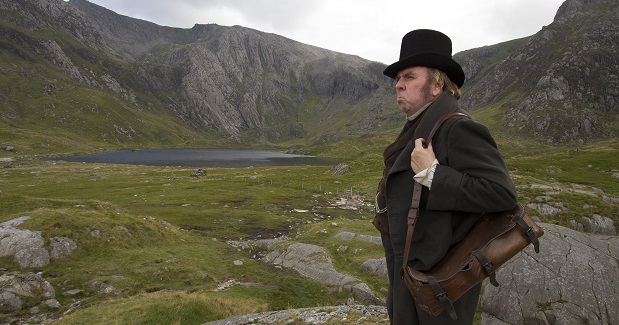For a second time on his career, Mike Leigh has put on hold his superbly observed everyday stories to depict the work of an artist from the Victorian-era, fifteen years after delivering his take on the world of comic opera writers Gilbert and Sullivan in ‘Topsy Turvy’ to great critical acclaim. This time he focuses in the life and artistic achievements of one of the most influential British masters, J.M.W. Turner, with extraordinary results. Wisely avoiding the traps of conventional biopics, where the obsession for an accurate chronological timeline often comes at the expense of making their subjects and those characters surrounding them believable as people, ‘Mr. Turner’ focuses in the last quarter of the painter’s life, a period where his art became more radical and his life more interesting.
Leigh’s terrific screenplay and his meticulous research displays great admiration for its character, covering everything from travels sketchbook in hand to the places of his Romantic landscapes to his peculiar work techniques at his home studio. It also takes a look at the artistic and intellectual class of the time, when the film hits it’s most humourous note by showing several gatherings with high society’s patrons of the arts, pompous critics’ conversations or fellow painters bitching around on the eve of a Royal Academy exhibition; Turner’s notorious feud with Constable being a part of it. His travels to Margate where he found his last partner in Mrs. Booth, landlady of the guest house he regularly stayed at, are also described, as are the philosophy and scientific advances giving shape to a changing world (from industrial revolution developments such as the steam boat and locomotive, to the first steps of photography with the arrival of the daguerreotype), altogether forming a richly textured, multi-layered portrait of a master.
In another typically accomplished acting showcase, with the helmer’s well-known methods of improvisation and thorough rehearsals in place, Timothy Spall, who won the best actor gong at Cannes and should be a strong contender for the Oscar, is superb in this complex study of the genius and his contradictions. His performance shows a not very likeable, rough mannered; often absorbed on his art grunting man who didn’t suffer fools gladly and felt like an outsider among the establishment that first embraced him and ended up mocking his ground-breaking late work. Passionate, capable of going to great lengths to accomplished his vision and generous with those he cared for (among them his father a barber who became his assistant and had a close relationship with or her last partner Mr. Booth), but also capable of neglecting others to the point of cruelty, refusing to acknowledge his wife and daughters or treating his maid, who was also a lover, with extremely cold detachment. Marion Bailey as Mrs. Booth and Dorothy Atkinson in the role of the maid are both excellent as the two women in Turner’s late period, whose diametrically different relationships with the man perfectly showcase his conflicting personality. The film also delivers fine turns by Ruth Wilson as his irate wife; Paul Jesson as his father; Lesley Manville as astronomer Mary Sommerville and a long cast of veteran actors.
A deeply researched and supremely well-crafted work, Tim Pope’s dazzling cinematography delves in Turner’s unique exploration of light and nature with some of the locations and surroundings that inspired his masterpieces inserted in between scenes. ‘Mr. Turner’ also boast top of the range production and costume designs all adding up to the film’s elegant beauty. To suggest that like Turner’s; Mike Leigh’s work is becoming more confident, refined and satisfactory with age is perhaps too easy, but ‘Mr. Turner’ comfortably ranks among his finest offerings and, if nothing else, it serves to re-assure Leigh as one of British cinema’s true greats.
★★★★★

